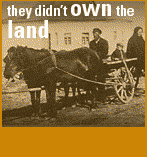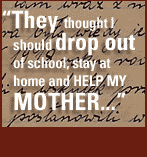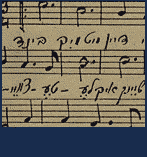

Yiddish Folklore
Both native speakers and those who are only vaguely acquainted with the existence of Yiddish believe that it is a language with a life of its own, a language with its own mentality, and one with a particular set of attitudes. To the extent that this is true, it is attributable in part to the folklore embedded within it. Folklore, a nation's body of customs, legends, beliefs, and superstitions passed on by oral tradition, imbues a language with its distinctive character. The Yiddish language has a rich folkloric tradition that reveals a great deal about the culture of Eastern European Jewry. Yiddish cultural values, for example, can be felt in the most popular lullabies. An ideal shared by rich and poor Jews alike was that of the importance of learning, a value woven into the famous lullaby "Afn pripetshik" (On the hearth):
On the hearth the fire blazes merrily
And the heat is great
And the rebbe teaches little ones
To learn Aleph Beth
Children, study hard and remember well
Learning is the law
Another populat Yiddish lullby is animated by the centrality of the merchant and trade to Eastern European Jewish life:
Under Yankele's cradle
Stands a pure white kid
Papa went traveling, Papa went trading
He will bring for Yankele
Raisins and almonds.
Yiddish proverbs attest to a hard-nosed ironic sensibility that accompanied the Ashkenazi Jew's abiding trust in God and confidence in his religious values. If praying did any good they'd hire you to pray, says one proverb. The proverb might sound like heresy. But the Jews who trotted out such a statement prayed, as required of a Jew, three times a day with devotion and fastidiousness. Irony was a way for the Jew to cope with the paradox of having to endure the continuous trials and tribulations experienced by the Jewish People as it, apparently, enjoyed the special status of being God's "Chosen People". Spare us what we can learn to endure, another proverb goes, referring to the Jews' ability to withstand great suffering. Suffering is something one has to learn to live with because it is forced upon you, but it is not something to be elevated or glorified.
One cannot leave the topic of Yiddish folklore without saying a word about "The Wise Men of Chelm", a body of stories about the fictionalized foolish men and women who live in a Polish town called Chelm. Although each story is witness to yet another extravagantly na´ve and foolish thing the town elders have concocted, the stories contain an underlying wisdom and touch on deeply philosophical ideas.












